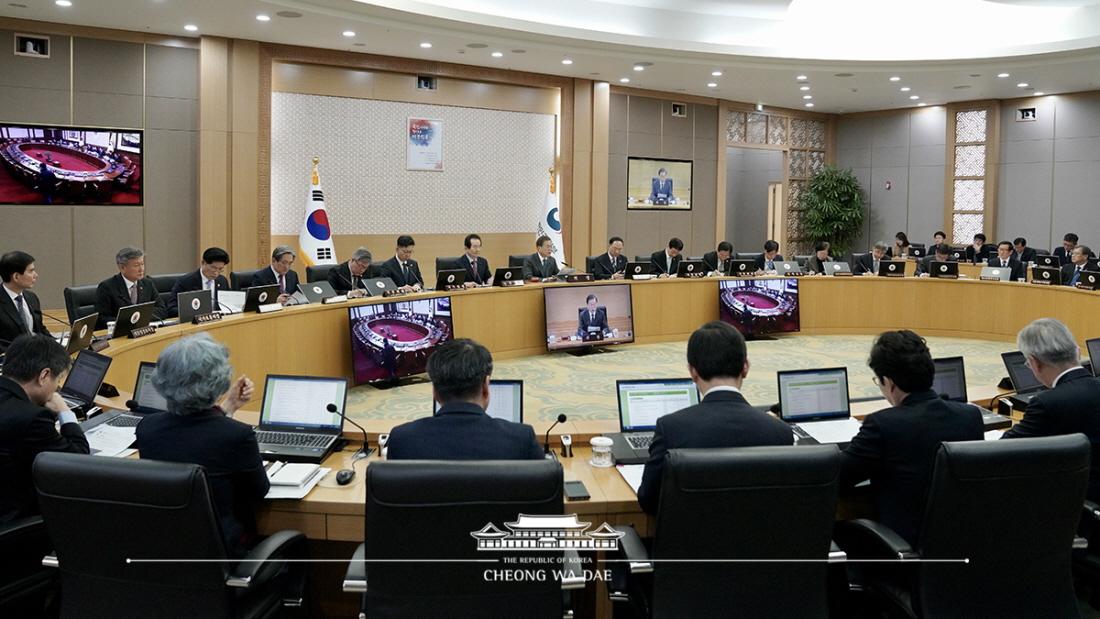이 웹사이트는 제19대 대통령 임기 종료에 따라 대통령기록관이 「대통령기록물 관리에 관한 법률」에 의해 이관받아 서비스하는 대통령기록물입니다. 자료의 열람만 가능하며 수정 · 추가 · 삭제는 불가능합니다.
다만, 「개인정보보호법」에 의하여 개인의 정보를 보호받기 원하시는 분은 관련 내용(요청자, 요청내용, 연락처, 글위치)을 대통령 웹기록물 담당자(044-211-2253)에게 요청해 주시면 신속히 검토하여 조치해 드리겠습니다. 감사합니다.
SPEECHES & REMARKS
BRIEFINGS

Let me begin the 3rd Cabinet Meeting.
During the first Cabinet Meeting of the New Year, the act establishing an agency to investigate corruption involving high-level officials was promulgated. Following that, the National Assembly passed bills last week to readjust investigative authority between prosecutors and the police. With these, a great milestone in the institutionalization of prosecutorial reform has been set.
The reform of law enforcement authorities is not the pursuit of a far-off ideal. In a democratic republic, the rightful owners of those organizations are the people. It is only natural that democratic principles should apply to the inner workings of law enforcement as well. Nonetheless, it is truly difficult to change a reality that has hardened into entrenched interests.
The establishment of an agency to investigate crimes by senior officials and the coordination of law enforcement authority between prosecutors and the police have been reforms sought over the past 20 year, but they have finally been accomplished through the strength of the people. I bow to the public to express my appreciation.
Up until now, it has been the National Assembly’s time to work on them, but from now on, they are important tasks for the Government. The implementation of these two tasks requires a lot of preparation. We do not have enough time to accomplish both of these. Not only should there be no setbacks in their implementation, securing objectivity and political neutrality will be essential from the preparatory stage onward.
In addition, as the saying goes, “the devil is in the details”; fine-tuning the details might be even more daunting. I urge the Ministry of Justice, the Ministry of the Interior and Safety, the prosecution service and the police to engage in sufficient communication and arrange a proper preparatory system that even takes into account the opinions of the judiciary as these two tasks are related to the entire justice system. I also ask the Prime Minister to personally attend to this matter.
Although the legislation to reform the prosecution has been completed, the legislative process related to comprehensively reforming law enforcement authorities is still underway. First and foremost, an integrated police act covering both the organization and operation of the police should have been passed along with the bill to readjust the investigative authority of the prosecution and police. At the core of reforming law enforcement authorities lies control over the abuse of power through checks and balances. In this regard, the establishment of a national headquarters for investigations and the agency to investigate crimes involving senior government officials, the adjustment of the investigative authority of the prosecution and police and the introduction of an autonomous police system are all tied closely together.
As the police gain more authority in line with the curtailed direct control over investigations by prosecutors, that authority has to be distributed in a democratic manner. For this reason, decentralization and the expansion of local self-governance have been pursued by introducing an autonomous police system along with the separation of police detectives from those in charge of administrative affairs through the establishment of a national headquarters for investigations. However, the two initiatives were dealt with separately in the course of processing the relevant bills.
The reform of the National Intelligence Service should also be backed up by legislation. The NIS has already carried out its internal reform by completely abolishing its domestic intelligence-gathering division and focusing on overseas and North Korea-related intelligence activities, but the bill to institutionalize these changes is still pending in the National Assembly. With the general election approaching, the 20th National Assembly doesn’t have much time left in its term. Still, I urge the National Assembly to expedite passage of the integrated police act and the bill to revise the National Intelligence Service Korea Act so that the prosecution, the national police, the autonomous police, the agency for the investigation of crimes among senior government officials and the NIS can complete their reforms through a system of checks and balances.
Besides reforming law enforcement authorities, the Government has continually worked to eradicate various forms of corruption that people face in their daily lives. The three kindergarten-related bills to be promulgated today are also a part of these efforts.
There were objections from some kindergarten associations during the legislative process, but the Government’s firm determination together with the rigorous demands of the people paved the way for the framework to strengthen the public service role of kindergartens.
Going forward, tuition paid by parents must be used exclusively for educational purposes, and those who commit accounting fraud in order to use it for other purposes or their own interests must be held strictly accountable under the law.
Parental rights to choose kindergartens will be strengthened, and the quality of the meals provided there will be managed and supervised according to clear standards. I expect that the transparency of accounting at kindergartens and the public service role of early childhood education will be drastically enhanced.
Passage of the three kindergarten-related bills does not necessarily mean that we have fully met the people’s demands. I ask you to make certain that related policies that are being pursued jointly – increasing the number of public kindergartens run by the central and local governments, resolving the hardships facing private kindergartens and improving the treatment of teachers – lead to changes in the field of early childhood education.
In addition, I would like you to come up with plans to improve regulations so that more support can be provided to those kindergartens that are making efforts to pursue transparent management and protect preschoolers’ right to education.



